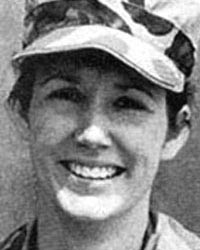
Major Marie T. Rossi-Cayton (1959-1991)Pilot : CH-47D Chinook Helicopter. First female U.S.Army aviator to fly into battle, first female U.S. Army aviator to be killed while flying combat support missions in an active theater of war
Major Rossi died at age 32 on March 1, 1991, when the Chinook helicopter she was piloting flew into an unlighted microwave tower at night and in bad weather the day after the Operation Desert Storm ceasefire had come into effect. The crash took place near her base in northern Saudia Arabia and also claimed the lives of three others in her crew.
A graduate of River Dell Regional High School near her home in Oradell, New Jersey, she entered Dickinson in the autumn of 1976 and graduated with her class of 1980 as a Psychology major. While at the College she was an Outstanding R.O.T.C. cadet. Major Rossi is buried in Arlington Cemetery, the only female casualty of the Gulf War so honored (as of when this page was written in 2002 - Ed). Her simple epitaph there commemorates her pioneering sacrifice and reads "First Female Combat Commander To Fly into Battle."
Major Marie T. Rossi-Cayton Major Marie T. Rossi-Cayton (Army Aviation Hall of Fame 1992 Induction) was an outstanding aviator and soldier who lost her life flying and soldiering in combat in Southwest Asia during Operation DESERT STORM. Major Rossi-Cayton, 32, the first female Aviation Commander to fly into combat, led B Company, 2nd Battalion, 159th Aviation Regiment, 18th Aviation Brigade and was the pilot of a CH-47D Chinook flying supplies to troops in the combat zone. One day before the ground phase of Operation DESERT STORM began, television viewers across the United States saw a Cable News Network (CNN) interview of Major Rossi-Cayton in which she spoke of her role as a woman flying in the combat zone. Major Rossi-Cayton commented that she would be among the first to cross into Iraq when the ground war started. In a "no big deal" context, she said, "Personally, as an aviator and a soldier, this is the moment that anybody trains for, so I feel ready for the challenge." With the selflessness of these words and thoughts, she captured and epitomized the excellence of today's Army leaders and aviators. Major Rossi-Cayton was the first female U.S.Army Aviator to be killed while flying combat support missions in an active theater of war. She set the example for the legions of female aviators and soldiers to follow - indeed for all who are to follow in the contingencies and wars of the future, male and female. She was an outstanding soldier who gave her life flying and soldiering in Southwest Asia.
|
© Copyright 1999-2007 CTIE - All Rights Reserved - Caution |
 Marie Therese Rossi Cayton, Major, USArmy (1959-1991)
Marie Therese Rossi Cayton, Major, USArmy (1959-1991)